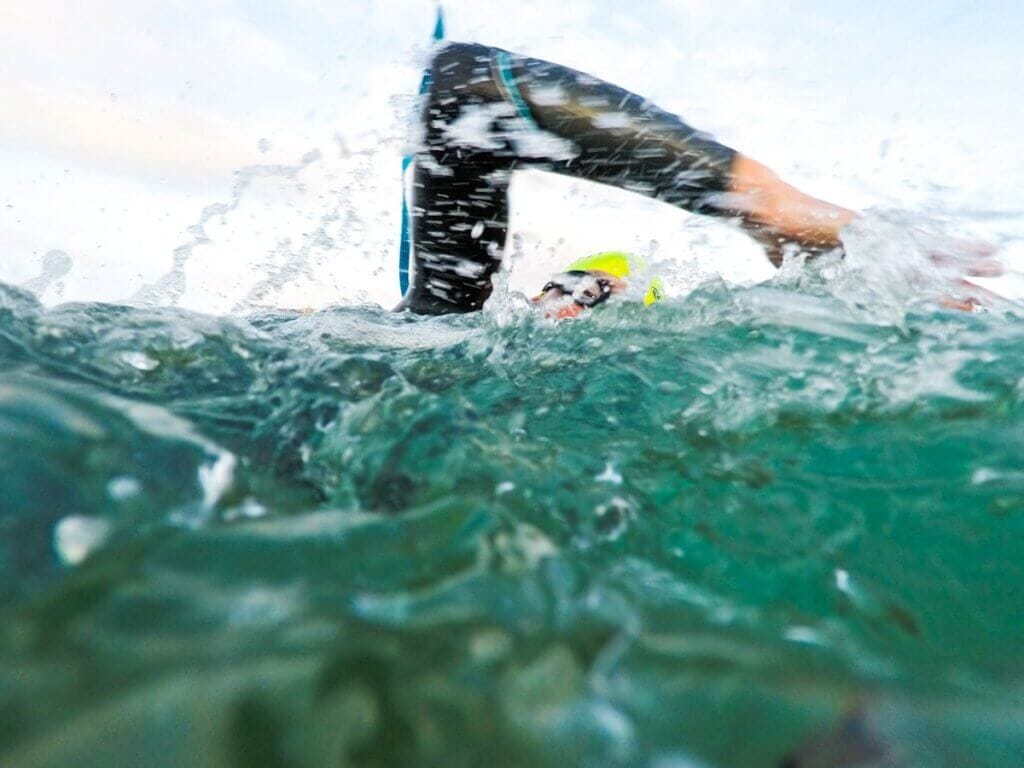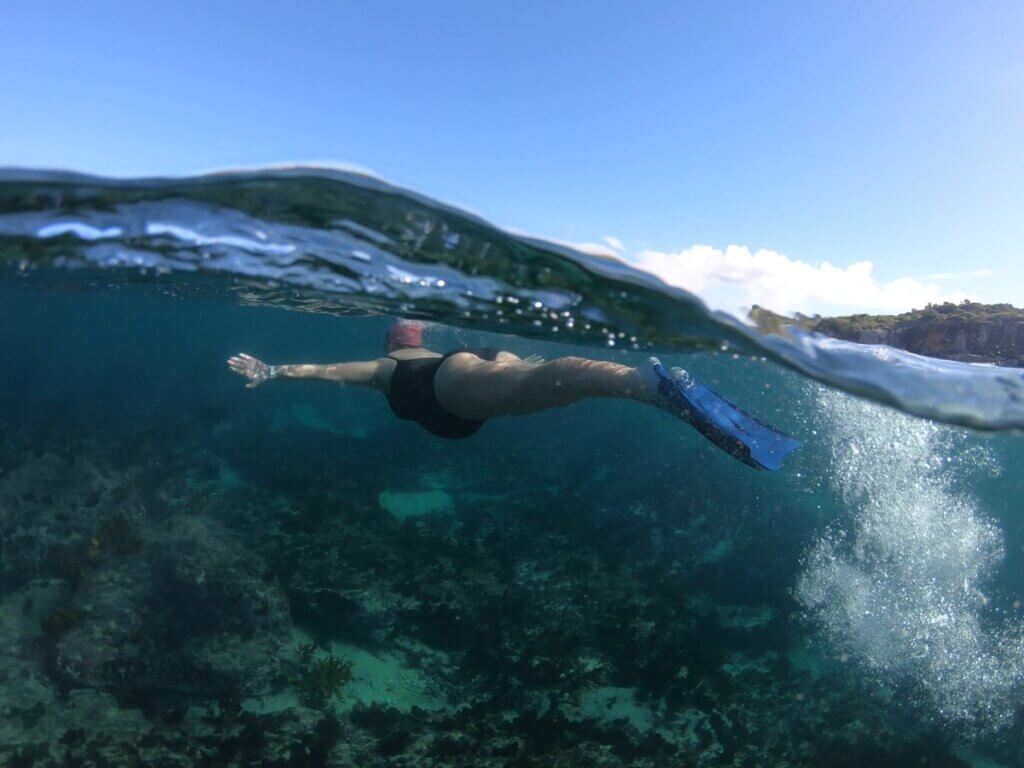5 most common ocean anxieties and how to overcome them

Whether it’s a niggling side-thought, or an inherent fear, nearly every beach goer or ocean swimmer becomes anxious within the ocean environment at some stage.
Here are the five most common ocean anxieties I have come across from clients in my time instructing in the ocean, and my suggestion for how to overcome them.
Five common ocean anxieties
Seaweed
 Interesting enough, seaweed is quite high on the list of things in the ocean that cause the highest level of ocean anxiety – especially in children. Seaweed is one of those ‘creepy’ things that scrape across your legs and come out of the blue giving you an instant concern of ‘what’s that!’. Seaweed can also be slimy and harbour all sorts of creepy crawlies which adds to it’s eww factor.
Interesting enough, seaweed is quite high on the list of things in the ocean that cause the highest level of ocean anxiety – especially in children. Seaweed is one of those ‘creepy’ things that scrape across your legs and come out of the blue giving you an instant concern of ‘what’s that!’. Seaweed can also be slimy and harbour all sorts of creepy crawlies which adds to it’s eww factor.
To overcome your fear of seaweed, get to know it better. Did you know seaweed is the core ingredient in sushi, ice cream, shampoo, toothpaste and makeup to name a few. As a type of marine algae, it’s also responsible for producing up to 70% of the world’s oxygen. Find some on a beach, pick it up and play with it.
Related anxieties: Blue Bottles (How To Treat A Blue Bottle Sting) & Sea Lice
Deep Water
 Considering the majority of people can’t swim, and more again can’t even float or tread water, it’s hardly surprising that deep water is high on the list of ocean anxieties. It’s not just the fear of not being able to stay afloat that makes this a popular anxiety, with deep water comes marine life and the ‘unguarded’ space below you as well as around you.
Considering the majority of people can’t swim, and more again can’t even float or tread water, it’s hardly surprising that deep water is high on the list of ocean anxieties. It’s not just the fear of not being able to stay afloat that makes this a popular anxiety, with deep water comes marine life and the ‘unguarded’ space below you as well as around you.
To overcome your deepwater anxiety learn to float, tread water and swim. Overcoming your fear of marine life and the unknown can be accomplished by spending more time in the deepwater environment.
Loss Of Control
 Losing control in any situation can be scary. In the ocean, an environment most people don’t know much about, it can be even scarier. Loss of control usually comes from your legs losing contact with the seafloor. When you don’t have contact with the seafloor you are likely to be floating and therefore at the mercy of currents which can move you towards deeper water further away from the shore – like rip currents.
Losing control in any situation can be scary. In the ocean, an environment most people don’t know much about, it can be even scarier. Loss of control usually comes from your legs losing contact with the seafloor. When you don’t have contact with the seafloor you are likely to be floating and therefore at the mercy of currents which can move you towards deeper water further away from the shore – like rip currents.
To overcome your fear of losing control, learn to stay in control through proactive techniques such as always keeping your eyes on the waves, ‘offensive-defensive’ standing body position in waves and techniques to dive under waves to name a few. Ultimately you need to understand how the ocean environment works and learn to work with it, rather than against it.
Waves
 Of all the differences between a beach and a pool, waves are a major difference and the single most influential element to affect the water environment. Waves can be powerful and relentless, and getting dumped by a wave and stirred up in or under the water can be frightening. As the waves get larger they become more frightening.
Of all the differences between a beach and a pool, waves are a major difference and the single most influential element to affect the water environment. Waves can be powerful and relentless, and getting dumped by a wave and stirred up in or under the water can be frightening. As the waves get larger they become more frightening.
To overcome your fear of waves you need to know how they are formed, how the seafloor influences the way they break and understand that the calmest place to be is beneath the wave in the calm water near the seafloor. It doesn’t matter how big the wave on top, the water is going to be calm on the bottom. Being able to dive under waves takes skill, especially from a swimming start, and it also takes a high level of fitness to deal with multiple waves.
Sharks
 This one is pretty obvious. Between Hollywood, sensationalist media reporting and a lack of understanding of this magnificent marine creature, sharks have received a bad rap. Of course, it doesn’t help that the occasional beachgoer is ‘attacked’ by a shark. For many of us, being attacked by a shark rates up there with the most terrifying thing that could ever happen to us. There wouldn’t be many seasoned watermen out there that don’t have even a little anxiety when it comes to sharks.
This one is pretty obvious. Between Hollywood, sensationalist media reporting and a lack of understanding of this magnificent marine creature, sharks have received a bad rap. Of course, it doesn’t help that the occasional beachgoer is ‘attacked’ by a shark. For many of us, being attacked by a shark rates up there with the most terrifying thing that could ever happen to us. There wouldn’t be many seasoned watermen out there that don’t have even a little anxiety when it comes to sharks.
To overcome your fear of sharks is not easy, in fact, I’d say it’s the hardest to overcome – the chances are there’ll always be a slight anxiety sitting in the back of your mind. You can put your mind at ease by learning more about sharks, dispelling the popular myths and putting your faith in the fact that statistically, you’re more likely to die in a car crash on the way to the beach than by a shark attack. In fact, shark sighting are so rare you should celebrate and soak up the moment if you do see one – knowing it doesn’t really have any interest in you.





Responses